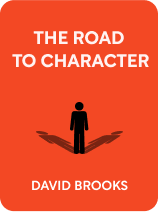

This article is an excerpt from the Shortform book guide to "The Road to Character" by David Brooks. Shortform has the world's best summaries and analyses of books you should be reading.
Like this article? Sign up for a free trial here .
What’s the problem with living a me-focused life? Why is it important to balance the two Adams that live inside of you?
In his book The Road to Character, David Brooks discusses the shift in the societal focus from “we” to “me.” To demonstrate that shift, Brooks talks about the idea that there are two Adams that live inside you, Adam 1 and Adam 2. Brooks says that you don’t need to choose sides, rather, you need to find a healthy balance between the two Adams.
Keep reading to learn about the problems with a me-focused attitude and how to balance your two Adams.
We Worship at the Altar of “Me”
New York Times columnist David Brooks believes that modern society has lost its moral compass, and our lives will feel empty until we find it again. In The Road to Character, he asserts that in the last 70 years—beginning soon after World War II’s end—our culture has undergone a huge moral shift toward narcissism.
Today we’re obsessed with personal success and individual achievements. We believe that the length of our resumés is the ultimate measure of our worth. We think that a successful career, fame, and a fat bank account equal a fulfilling life. We broadcast our tiniest personal victories on Facebook and Instagram while we cover up, ignore, or even lie about our character flaws. We’re so busy achieving—and telling our friends what we’ve achieved—that we don’t waste a single moment wondering if there’s any higher purpose for our lives.
The Problems With a “Me-Focused” Life
Ironically, in our conquest for external success, we’ve made ourselves unhappy. As we center our lives around “living the good life”—striving for fabulous careers, sprawling mansions, and glamorous vacations—we’ve lost our connection to the moral values that bring deep, lasting joy. Happiness can’t be found in achievements; it lies in the battle for higher moral character. Our life’s most meaningful work is to become better human beings—individuals who are humble, virtuous, loving, and more interested in service to others than to the self.
Resumé Virtues Versus Eulogy Virtues
There’s a big difference between “resumé virtues” (job-related skills and successes) and “eulogy virtues” (the personality traits that people talk about at your funeral). Most of us would say that eulogy virtues are more important than resumé virtues, but we give lip service to eulogy virtues while we spend the bulk of our time building resumé virtues.
Truthfully, what matters to you more—being famous or being a great friend? Would you rather be remembered as a top salesperson or a devoted parent? These are hard questions because our culture rewards us for external achievements, not for cultivating our virtue, building our character, and being the best human beings we can be. “Eulogy virtues” are only lauded after we’re dead.
Defining Humans’ True Nature
Philosophers have long studied human nature, considering the ways in which we are governed by competing influences: good versus evil, generosity versus selfishness, and so on. For much of western civilization, the prevailing school of thought has been that humans have a natural tendency for selfishness and narcissistic self-love. But we also have free will, and we can choose not to be enslaved by our selfish desires.
Brooks references the writings of rabbi and scholar Joseph Soloveitchik, who believed that the Book of Genesis contains two accounts of creation that represent the opposing sides of human nature. “Adam 1” is our ambitious, career-oriented self and “Adam 2” is our moral, internal self who aims for the greater good, regardless of personal ambitions.
Meet an Adam 1
Adam 1 is very busy. She’s buying a big suburban house and winning accolades at work. She is constantly proving to the world that she is at the top of her game. In doling out her time and energy, she always puts herself, her career, and her finances first. She prioritizes time over people—after all, it takes a lot of hours and energy to continually improve her skills, knowledge, and abilities, and she knows she’ll get rewarded. She manages her life like a well-thought-out business plan.
How to Cultivate Our Adam 1 Nature
In order to develop our Adam 1 natures, we must spend time nurturing our strengths—our talents, intelligence, and professional skills. To do this, we have to develop an achievement-oriented mindset, and we have to put ourselves first. We study hard to get into the best colleges, we work long hours to win big promotions at work, we make friends with people who can help us get ahead, and we marry into the “right” families. We even make sure we have a big social media presence—tons of Facebook friends—so that everybody can keep track of our upwardly-mobile progress.
How Adam 1s See Themselves
People with a well-developed Adam 1 side don’t spend time worrying about their inner lives or moral compass. Since they are rewarded by society for their many achievements, they never even consider the question of whether or not they are virtuous enough. They slip into “moral mediocrity,” assuming that if they’re popular and well-liked, they must be good enough.
Meet an Adam 2
Adam 2 may or may not have achieved worldly success, but she is deeply concerned about the health and welfare of her family, friends, co-workers, and neighbors. She works hard all day at her job, volunteers at the soup kitchen in the evenings, and helps out her elderly parents on the weekends. The neighborhood kids always seem to gather at her house, where she makes time to listen to their problems and cheer them on. Nonetheless, she is humble about her life. She doesn’t talk much about herself or her activities because in her mind, it’s not remarkable. She’s just doing what needs to be done.
How to Cultivate Our Adam 2 Nature
In order to develop our Adam 2 natures—which is essentially our moral core or character—we must confront and analyze our weaknesses (which might be selfishness, egotism, alcoholism, sex or love addiction, laziness, lack of empathy, a need for attention, or any number of other vices). We need to face up to the fact that we are far from perfect. Once we identify our faults, we can work on self-improvement. We can make it our daily work to build stronger character and become better human beings.
How Adam 2s See Themselves
People who have a well-developed Adam 2 side are reserved, self-effacing, humble, dignified, respectful, and restrained. They are well aware of their flaws, so they don’t go around telling or showing the world how great they are. Instead, they make everyone around them feel good because they are not focused on themselves. And they always look around to see where their service is needed. Like Adam 1s, Adam 2s are doers, but they’re not usually doing for themselves. They perform “other-oriented” acts of service without expecting praise or gratitude. They ask themselves, who needs assistance? What needs to be done? What gifts do I have to offer that will make this world a better place?
Real-Life Example: Adam 1 and Adam 2
Football quarterbacks Joe Namath and John Unitas were both amazing sports heroes. Both were raised in Pennsylvania steel towns, but they were brought up differently (and a decade apart). As adults, they subscribed to vastly different moral codes. Namath was a flamboyant showman and a shameless self-promoter. He often talked about how handsome he was and how the ladies adored him. He was a superstar who defined himself by “personal branding” before that term even existed. Namath was a classic Adam 1.
John Unitas was an equally outstanding quarterback, but he was understated, self-effacing, almost shy. He treated his record-breaking football career like it was a routine job, no different than being a plumber or a salesman. He was hounded by the press, but he dreaded talking to them. Unitas was a true team player who never hogged the limelight—in fact, he preferred to see his teammates shine. He was a classic Adam 2.
Let Adam 1 Make Friends With Adam 2
As discussed, our culture rewards us for cultivating our Adam 1 sides—not Adam 2—which makes it more difficult to choose a righteous moral path. Spending time and effort to get into Princeton or rise to the top seat of a corporation are actions that are praised by our society. Spending time and effort to confront and overcome our weaknesses in order to build character and become a better human being is “invisible” inner work, and doesn’t wind up on our resumés. But we should be cultivating both sides of our nature, whether those actions are rewarded or not.
The good news is that the Adam 1 versus Adam 2 conflict doesn’t require a binary solution. We don’t have to quit our jobs and become monks to live better, more virtuous lives. If everyone did that, our entire economy would collapse. For the sake of our nation’s well-being, we must be productive workers and consumers, we must work hard at school and careers, we must make money and support ourselves. There has to be a functioning Adam 1 inside all of us. The key is not to develop our Adam 1 self at the expense of Adam 2. The two Adams must learn to live side-by-side.
We’ve let Adam 1 grow so large that we have forgotten the wisdom of Adam 2, and we’ve lost the deep, abiding joy of living an Adam 2 life. We need to re-balance the two worldviews.

———End of Preview———
Like what you just read? Read the rest of the world's best book summary and analysis of David Brooks's "The Road to Character" at Shortform .
Here's what you'll find in our full The Road to Character summary :
- How the world has become "me-focused" rather than "we"
- An analysis of eight historical figures who selflessly contributed to the greater good
- A 15-point plan to help you live a more virtuous and happy life






